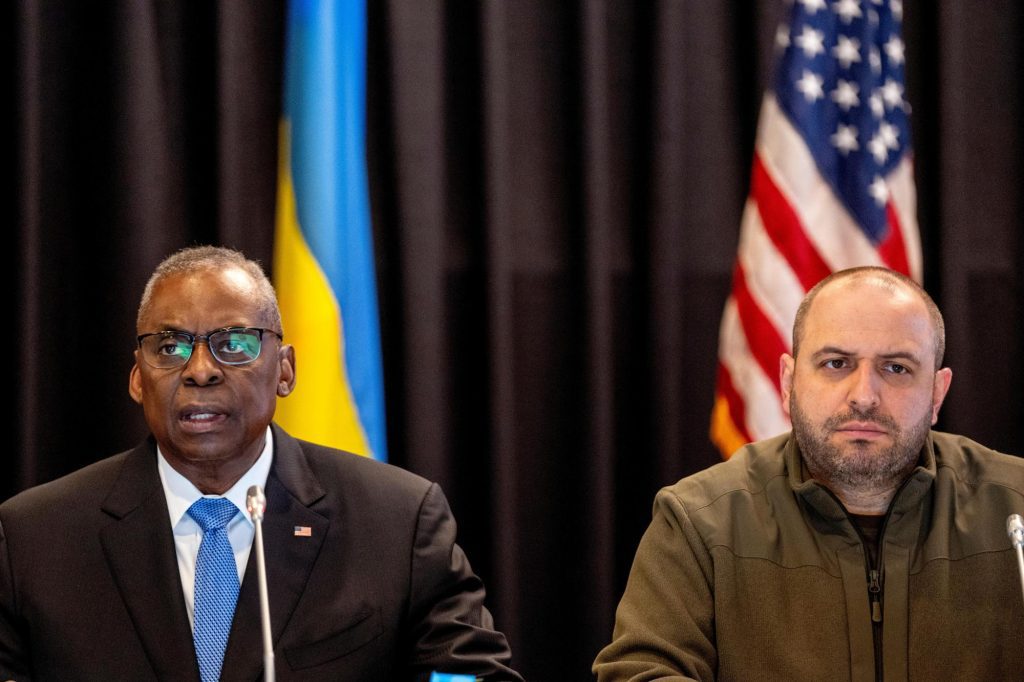By LOLITA C. BALDOR (Associated Press)
RAMSTEIN AIR BASE, Germany (AP) — Defense Secretary Lloyd Austin pledged on Tuesday that the U.S. will keep backing Ukraine’s war effort against Russia, even as the U.S. Congress remains delayed in providing funds to send more weapons to the front.
“The United States will not allow Ukraine to fail,” stated Austin, speaking to over 50 defense leaders from Europe and around the world who are gathering at the Ramstein Air Base in Germany. “This coalition will not allow Ukraine to fail. And the free world will not allow Ukraine to fail.”
The meeting occurred one week after U.S. defense officials discovered and utilized $300 million in contract savings to finance a new set of military aid for Ukraine, extracting weapons from Pentagon supplies.
During the meeting, leaders from other countries discussed fresh aid for Ukraine. German Defense Minister Boris Pistorius informed reporters that Germany will supply ammunition and armored and transport vehicles valued at about $542 million (500 million euros).
“We are assisting Ukraine with the most vital needs in its defense against Russian aggression,” Pistorius mentioned, adding that the aid involves 10,000 rounds of ammunition from the German Army, or Bundeswehr, supplies that would be promptly sent to Ukraine, along with 100 armored vehicles for the infantry and 100 transport vehicles.
When asked about whether he still views the Americans as a reliable partner given the ongoing delay in funding approval by Congress, Pistorius remarked, “I have no doubts about the reliability of the Americans.”
The $300 million U.S. aid package was the initial installment of weapons sent by the Biden administration since December, despite the increasingly dire battlefield circumstances in Ukraine.
The located funds — referred to as a “one-time shot” by officials — enabled the Defense Department to use presidential drawdown authority, or PDA, to withdraw weapons and equipment from Pentagon stocks and swiftly send them to Ukraine. The funds are then utilized to purchase replacement items to guarantee the readiness of the U.S. military to defend and safeguard the homeland.
For the past three months, U.S. leaders had asserted that they couldn’t take more weapons off the shelves because they had run out of money to replenish the stocks. Congress has been deadlocked for months over a new $95 billion supplemental bill that includes about $60 billion in aid for Ukraine.
U.S. officials claim there is bipartisan support for the package, but several Republicans oppose it, and House Speaker Mike Johnson has refused to bring the bill to the House floor for a vote.
Funding for training Ukrainian forces is also in jeopardy. The U.S. Army regional command for Europe and Africa, stationed in Germany, has spent over $500 million from its base budget so far this fiscal year to conduct the training and anticipates running out of money by June, according to U.S. officials.
The command spent about $2 billion for training in the fiscal year that concluded on September 30, which was financed through supplemental funding approved by Congress. The U.S. has trained approximately 19,000 Ukrainian forces to date, the majority of them at the Army bases in Germany. Altogether, the international coalition has trained over 129,000 Ukrainians at more than 100 different locations worldwide.
The training of Ukrainian troops has slowed down because the U.S. is waiting for the next large group of Ukrainian troops. It's hard to schedule because Ukraine often has to take troops from the battlefront to send them for training.
U.S. officials have been publicly expressing the hope that lawmakers will act soon to approve the extra bill. But they have also been struggling to find other ways to give assistance to Ukraine.
Defense officials keep warning that Ukraine is still heavily outgunned by Russia on the battlefield. They also mention ongoing reports of Ukrainian troops having to ration or running out of ammunition on the front lines.
Last month, Ukrainian troops pulled out from the eastern city of Avdiivka, where outnumbered defenders had held off a Russian assault for four months. Troops complained of running low on ammunition while facing a constant barrage of airstrikes from glide bombs, enormous unguided Soviet-era weapons, retrofitted with a navigational targeting system, that obliterate everything around them, as well as motion-sensing explosive drones that could enter buildings and hunt personnel.
Tuesday marks the 20th meeting of the Ukraine Defense Contact Group, which has been the key organization coordinating for the delivery of weapons and other aid to Ukraine.
In his opening remarks, Austin said Russia has paid a “staggering cost” for the war, repeating estimates that at least 315,000 Russian troops have been killed or wounded in the war, which has cost Moscow up to $211 billion.
“Ukraine’s troops face tough conditions and intense fighting. And Ukraine’s civilians endure a constant barrage of Russian missiles and Iranian drones,” said Austin. “But Ukraine won’t back down. And neither will the United States.”
___









